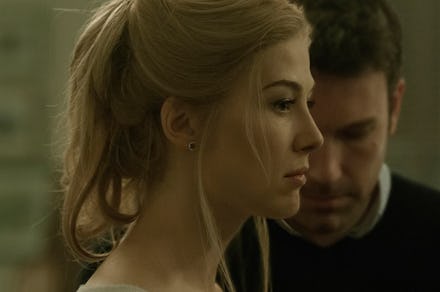No, 'Gone Girl' Does Not Have a Woman Problem

Gone Girl, the film adaptation of Gillian Flynn's novel of the same name, has garnered much controversy over its treatment of women.
Warning: Spoilers ahead.
"Yes, Gone Girl Has a Woman Problem," proclaimed Vulture's headline, as the piece argued that cinematic conventions required director David Fincher to focus more on Nick's side of the story, robbing Amy of her emotional complexity and turning her into a "psycho bitch," as Nick refers to her. But is a film that features a sociopathic female character by definition misogynistic?
Flynn, who also wrote the screenplay, doesn't think so. She told the Guardian last year that she suggested that feminism is in part about "the ability to have women who are bad characters."
"The one thing that really frustrates me is this idea that women are innately good, innately nurturing ... there's still a big pushback against the idea that women can be just pragmatically evil, bad and selfish," she said.
In other words, feminist texts should not shy away from unflattering depictions of women. It is counterproductive to hold women up as mere ideals. As a cautionary tale, in fact, that's exactly what Gone Girl is about.
Although the book goes into more detail as to the root of Amy's psychosis, the film does more than enough to show how Amy as "psycho bitch" is really just a product of her environment. We get the sense that all the men in her life — from Desi (Neil Patrick Harris) to Nick to her father — have tried to mold her into their idea of what a woman should be. They've ostensibly written a fiction for the character of Amy and her life, which is where the whole story begins and ends. The complexity of that argument and the subtle way with which it's depicted makes for a film that does not have a woman problem; on the contrary, it makes some of the most important points about feminism and women that we've seen on screen this year.
For Amy this pattern and problem of her fictionalized life begin early on. The key symbol of her oppression comes from her parents and the way they "plagiarized" her childhood into a series of successful Amazing Amy children's books.
Understanding those books and their fallout means more thoroughly understanding the character of Amy. The books represent the most basic, unshakeable kind of institutional oppression. Her parents, the people who are supposed to unconditionally accept her, did more than "plagiarize" her childhood — they improved upon it.
As one example, Amy tells Nick she got cut from the high school volleyball team after freshman year, but Amazing Amy made varsity. The books represent the first, but not the last time, Amy would be held accountable to someone else's standard.
As Amy's life went on, she was asked to live up to other fictitious American ideals: the supportive housewife, the blonde bombshell and, of course, the cool girl.
Despite the preponderance of evidence that Amy is, at least in part, a product of her environment, most critics still agree that the film takes Nick's side. Much of this has to do with a misunderstanding of Fincher's oeuvre — he has been charged with misogyny for decades, with critics pointing to his male-fixated movies like Se7en, Zodiac, Fight Club and The Game as justification. But if the women in these films are thinly drawn, it's because Fincher is showing how they are thoroughly dominated by cultural maleness. Gwyneth Paltrow's head ends up in a box in Se7en, after all, because she is a pawn in a juvenile game being played by men with existential issues.
Further, despite his reputation, Fincher has a long track record of creating complex roles for women who are struggling to survive in a system dominated by cultural maleness. Think of Meg Altman (Jodie Foster) in Panic Room, Zoe Barnes (Kate Mara) in House of Cards and even Erica Albright (Rooney Mara) in The Social Network, who, while only appearing in the opening scenes, is sort of the conscience of the movie. Hell, Fincher's first feature was Alien3, the third chapter in the story of one of film's first female action heroes, Ellen Ripley (Sigourney Weaver).
With each passing film, the charges of misogyny seem less clear cut. And so it is with Gone Girl.
It would be going too far to call the film a feminist text, since a regressive male who believes "bitches be crazy" could easily see his simplistic worldview confirmed by the film. This happens because Fincher is adhering to the oldest, most important rule of filmmaking: Show, don't tell. Instead of placating his progressive audience and turning Amy into an obviously feminist hero, he dramatizes the patriarchy, even telling the story largely from a patriarchal point of view, while giving us enough clues to understand that he is not endorsing it.
By flipping back and forth between Amy's and Nick's viewpoints, we begin to see the ways that Nick's view of his wife as a "psycho bitch" is biased in ways that he cannot possibly understand. He can't see that she is a product of her environment because he is the environment, and that's one of the most bold, complex statements about feminism you will see in a studio film all year.